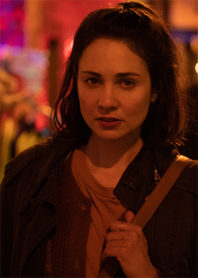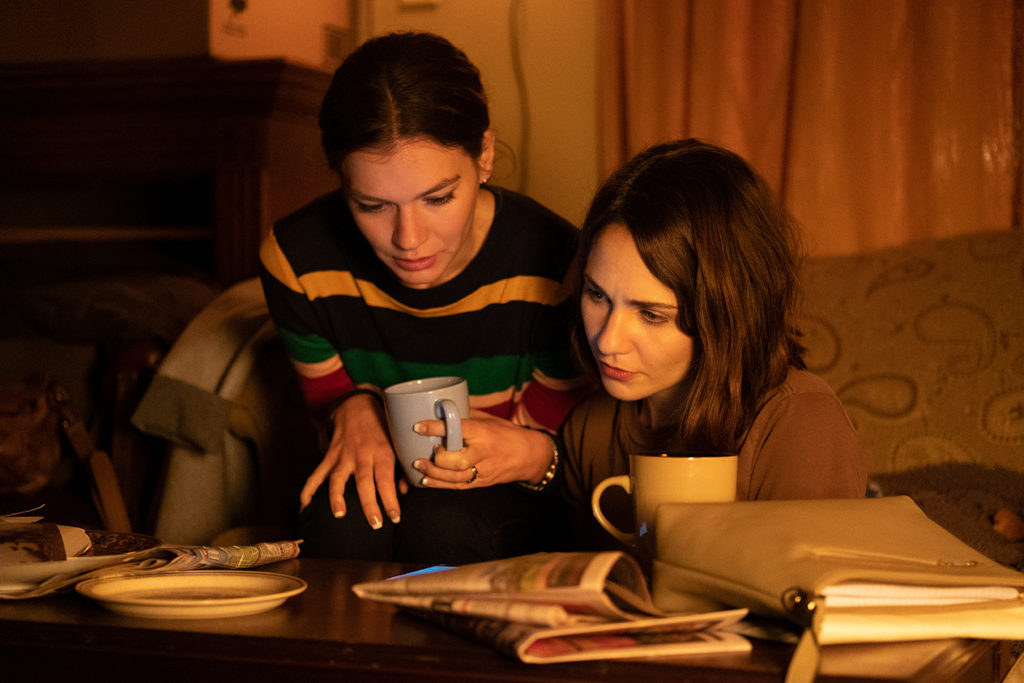
Go to most retail outlets in the Niagara peninsula and you will see signs of “Today we value 1$US at …” next to the cash register. With only a few historical exceptions, the Canadian dollar is always a fair bit less than its USA counterpart. There is a similar inferiority complex in Canadian cinema, one that is often on display in Disappearance At Clifton Hill, which plays in equal parts like a ‘Canadian-Nice’ homage to Blue Velvet or a David Fincher crime procedural. You know, where location and defying expectations play a large part of the narrative. This downmarket version is raggedy and loose too often, but as they say in real estate: Location. Location. Location.
This sounds like a back-handed compliment. Indeed, in spite of its sometimes shaky narrative cohesion and occasional off-kilter performances, there is a non measurable quality to the film that gently lures you in. After a measured and precise start, at about the half-way mark, things become pleasantly mired in droning VHS dream sequences, implied paedophilia, Tiger fetishes, and name checking Orson Welles’ Nazi-noir, The Stranger; the film caresses you with its degeneracy. Like many a good thriller, you begin to doubt what you are seeing is even real. Everything here exists in the margins. Rather than go all in and over the top like our neighbours to the south — you will not find Dennis Hopper hopped up on gas and screaming mommy, but you will find a quiescent victim on oxygen. There is a resigned Canadian pragmatism at play here that might be unfamiliar to moviegoers who avoid the local product, but it feels necessary to give the ending more of a zip than if things were played too outrageous or flashy.
Chameleon actress Tuppence Middleton plays Abby a thirtysomething drifter who returns to her hometown to sign some paperwork on her mother’s estate and confront a particular incident from her past. I defy you to typecast, or perhaps even make the connection here, that it is the same actor from Sense8 and Downton Abbey. Middelton is given the task to play a capable and curious, but broken woman, who is also a risk taker and a pathological liar. It mostly works because of her Tom Hardy-like undefinability in visage and c.v.

In the films most cinematic sequence, a young Abby is fishing with her parents along the Niagara river in 1994, spies a young boy missing an eye hiding in the forest. He gently shushes her, blood running down his face, before he is grabbed by a pair of sinister looking adults, beaten with a tire iron, and thrown in the back of a battered Chrysler. Justifiably disturbed by what she just witnessed, the forgotten fish left flopping on the forest floor, she returns to her parents who want to take a pretty picture along the riverbank, while she looks awkwardly towards the road, and her future.
Years later, in almost the exact same spot, she meets David Cronenberg, or rather the small town historian, conspiracy nut, Walter, who dives for lost things and sometimes bodies. Having the patron saint of Canadian horror cast his benediction (and his wonderful voice) over the film is a coup of sorts. See also the bonafide Canadian classic, Last Night. Together they make an odd pair, certainly odder than Jimmy Stewart and Grace Kelly, when it comes to snooping about for local skeletons.
Anyone local to Niagara Falls knows the town more as a tourist trap mainstay more than ‘one of the seven natural wonders of the world.’ If you are bringing visiting relatives to The Falls (or the adjacent Fallsview Casino) on a regular or semi-regular basis, you have probably made your peace with tacky and seedy Clifton Hill, a wax-museum and lazer-tag studded promenade that has barnacled itself to the main attraction. The most delightful thing about Disappearance At Clifton Hill is that it invites us to take a closer look through the eyes and imagination of someone who lived and breathed the space from the 1990s until film-school.
Albert Shin’s neo-noir, with echoes of autobiography (that wonderful opening scene sort of happened to him directly as a child) takes place in the lurid sodium lamp and neon spaces away from The Falls, the dilapidated motor lodges, dime-store stage magic, and themed diners of the region that are strangely attractive at night in all their seedy glory, but look depressing and banal in the harsh light of a morning hangover. At the film’s Toronto International Film Festival debut, Clifton Hill (as it was more succinctly titled) had some of the Region’s politicians and business associations in a snit, so the film must be doing something right, at pennies on the dollar.
- Release Date: 2/28/2020

